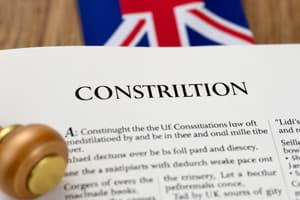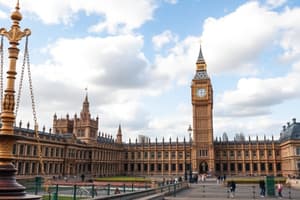Podcast
Questions and Answers
Explain why the US constitution is described as 'codified' while the UK constitution is 'uncodified'.
Explain why the US constitution is described as 'codified' while the UK constitution is 'uncodified'.
The US constitution is written in a single document, whereas the UK constitution is derived from multiple sources including statute law, common law, and conventions.
Describe the role of the US Supreme Court as the 'guardian' of the constitution.
Describe the role of the US Supreme Court as the 'guardian' of the constitution.
The US Supreme Court interprets the constitution, ruling on the constitutionality of laws and actions, ensuring they align with constitutional principles. This establishes constitutional rights that can only be removed through constitutional amendments.
What are the main sources of the UK constitution?
What are the main sources of the UK constitution?
The main sources of the UK constitution are statute law, common law, conventions, authoritative works, and treaties.
Explain how executive orders are used in the US system and their impact on the balance of power.
Explain how executive orders are used in the US system and their impact on the balance of power.
Compare the separation of powers in the US and UK systems of government.
Compare the separation of powers in the US and UK systems of government.
In which country, the US or the UK, does sovereignty lie with the constitution, and in which does it lie with parliament?
In which country, the US or the UK, does sovereignty lie with the constitution, and in which does it lie with parliament?
Describe how Parliament in the UK can exercise checks on the government.
Describe how Parliament in the UK can exercise checks on the government.
How can the US Congress check the power of the president?
How can the US Congress check the power of the president?
Outline the role of the US Supreme Court in protecting citizens' rights.
Outline the role of the US Supreme Court in protecting citizens' rights.
Explain why rights are considered less secure in the UK compared to the US.
Explain why rights are considered less secure in the UK compared to the US.
What is required for a constitutional amendment to be made in the US?
What is required for a constitutional amendment to be made in the US?
In the UK, what democratic mechanism is often used for fundamental constitutional changes?
In the UK, what democratic mechanism is often used for fundamental constitutional changes?
Compare the federal system in the US with devolution in the UK.
Compare the federal system in the US with devolution in the UK.
Explain how Westminster can alter the powers of devolved institutions in the UK.
Explain how Westminster can alter the powers of devolved institutions in the UK.
How does the 'rational approach' explain the behavior of individuals in both the US and UK?
How does the 'rational approach' explain the behavior of individuals in both the US and UK?
What does the 'cultural approach' focus on when comparing the constitutions of the US and UK?
What does the 'cultural approach' focus on when comparing the constitutions of the US and UK?
Explain how the 'structural approach' differs between the US and UK constitutions.
Explain how the 'structural approach' differs between the US and UK constitutions.
How does the independence of the judiciary influence both the US and UK constitutions?
How does the independence of the judiciary influence both the US and UK constitutions?
Describe a key difference in the amendment processes of the US and UK constitutions.
Describe a key difference in the amendment processes of the US and UK constitutions.
Apart from the Supreme court, what other body can interpret the UK constitution?
Apart from the Supreme court, what other body can interpret the UK constitution?
Flashcards
Codified Constitution (US)
Codified Constitution (US)
Written in a single document, created during the Revolutionary War to define government structure.
Uncodified Constitution (UK)
Uncodified Constitution (UK)
Existing across multiple sources and evolved over hundreds of years.
Sources of UK Constitution
Sources of UK Constitution
Statute law, common law, conventions, authoritative works, and treaties.
Separation of Powers
Separation of Powers
Signup and view all the flashcards
Checks and Balances
Checks and Balances
Signup and view all the flashcards
Checks and Balances in the UK
Checks and Balances in the UK
Signup and view all the flashcards
Checks and Balances in the US
Checks and Balances in the US
Signup and view all the flashcards
US Bill of Rights
US Bill of Rights
Signup and view all the flashcards
Rights in the UK
Rights in the UK
Signup and view all the flashcards
US Constitutional Amendment Process
US Constitutional Amendment Process
Signup and view all the flashcards
UK Constitutional Changes
UK Constitutional Changes
Signup and view all the flashcards
Federal System (US)
Federal System (US)
Signup and view all the flashcards
Devolution (UK)
Devolution (UK)
Signup and view all the flashcards
Rational Approach
Rational Approach
Signup and view all the flashcards
Cultural Approach
Cultural Approach
Signup and view all the flashcards
Structural Approach
Structural Approach
Signup and view all the flashcards
Cultural Approach in US
Cultural Approach in US
Signup and view all the flashcards
Cultural Protection of Rights in the US
Cultural Protection of Rights in the US
Signup and view all the flashcards
Structural Sovereignty
Structural Sovereignty
Signup and view all the flashcards
Parliament can block government bills
Parliament can block government bills
Signup and view all the flashcards
Study Notes
UK vs. US Constitutions: A Comparison
- The discussion revolves around comparing and contrasting the constitutions of the UK and the US, specifically tailored for A-level politics specifications.
- The areas of focus include the nature, sources, provisions, principles like separation of powers, checks and balances, the federal system in the U.S. versus the UK's devolution, and the application of rational, cultural, and structural approaches to understand the similarities and differences.
Codified vs. Uncodified Constitution
- The US constitution is codified, meaning it is written in a single document.
- The UK constitution is uncodified, existing across multiple sources.
- The US constitution was created during the revolutionary war by the founding fathers who set out how Government should work in a document.
- The UK constitution evolved over hundreds of years so there was no need to put it in writing.
- The US constitution is worrysome about too big and powerful of a government.
- The UK constitution reflects a lack of revolution, allowing easy changes over time.
Sources of the Constitution
- The US constitution is primarily found in a single codified document with 27 amendments.
- The US Supreme Court plays a crucial role as the guardian of the constitution, interpreting its provisions.
- The UK constitution is uncodified with many sources: statute law, common law, conventions, authoritative works, and treaties.
- There is a degree of vagueness in both constitutions, allowing room for interpretation by politicians.
- In the US, executive orders are used extensively by presidents, sometimes bypassing congressional declarations of war.
Separation of Powers, Checks, and Balances
- The US constitution has a strong separation of powers to prevent anyone from being in two branches at the same time.
- The executive (President), legislature (Congress), and judiciary (Supreme Court) are distinctly separated in the US.
- The UK has three branches, but the separation is weaker; the executive sits within the legislature.
- In the UK, Parliament is sovereign, whereas in the US, sovereignty lies with the constititution.
- In the US, it is unusual for the president to have both houses of Congress controlled by the same party, limiting their power.
- Both the US and UK have checks and balances, but differ in strength.
Checks and balances in the US and UK
- In the UK, Parliament can block government bills or even remove the government through a vote of no confidence.
- The House of Lords can delay decisions, and the Supreme Court can reverse government actions but only if those actions contravene legislation, nothing in the constitution.
- In the US, Congress can block the president's bills, overturn vetoes, reject appointments/treaties, and even impeach members of the executive or judiciary.
- The US congress controls the federal budget and has the power to declare war, while the president can veto bills and appoint judges.
- The US Supreme Court can deem laws or executive actions unconstitutional, safeguarding citizens' rights.
Rights and Amendments
- Both the US and the UK pride themselves on being liberal democracies by protecting the rights of their citizens.
- The US has the Bill of Rights enshrining key constitutional rights that can only be removed through constitutional amendment.
- In the UK, rights are less secure because they can be removed by acts of Parliament.
- The US constitution is less flexible than the UK's, requiring a complex amendment process of two-thirds of both houses, and three-quarters of all states.
- In the UK, fundamental changes to the constitution tend to go through referendums, not with a binding result, but to show a degree of democracy.
Federal System vs. Devolution
- The US operates under a federal system where states hold independent rights and powers enshrined in the constitution.
- The UK has devolution, where devolved institutions like the Scottish Parliament have powers given to them by Westminster, which could also be removed.
- Scotland and Wales have parliaments, and England has MPs in Westminster while Yorkshire remains without any devolved body.
- The US has a uniformed federal system with the same powers whilst the UK is less straight forward.
- It is unlikely that devolution could be overturned though it could be legally.
Rational, Cultural, and Structural Approaches
- Rational Approach: Individuals act based on self-interest which is regulated by law.
- Americans are able to follow their own self-interest more regularly because there are more frequent elections so the government is more responsive.
- Cultural Approach: Focuses on the influences of groups such as factions, cultures, political parties.
- There is stronger cultural protection of rights in the US than in the UK.
- Structural Approach: Centers on structures like the constitution, separation of powers, checks and balances, etc.
- The US constitution disperses sovereignty across the system whilst in the UK it lies with parliament.
- Both countries constitutions have independent judiciaries and structures for regional power.
Studying That Suits You
Use AI to generate personalized quizzes and flashcards to suit your learning preferences.




